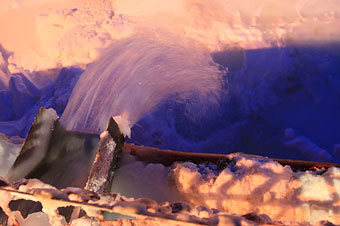

 | |||||||||
|
|
Journals 2007/2008Jason Pavlich
December 30, 2007 Position 70° 58.691' N 123° 29.642' W We are stuck. As in no longer moving, not going anywhere but where the current takes us stuck. We started moving about 8:15 am. When you are breaking ice it is hard to get any work done. One minute the ship is moving swiftly and smoothly through an open-water lead and the next you are getting thrown about as you walk down the hallway. People are taking advantage of the down time in anticipation of the longer work days to come when we reach the next station. Some people caught up on sleep, some watched movies, others read. I picked up a James Pattison novel, Jack and Jill, off the library shelves and relaxed with a cup of hot chocolate. Our progress was stopped around 5 pm. The Amundsen is designed to slide up onto the ice sheet then crush it with its weight and thus far was performing admirably. The winds the past few days, however, had apparently caused a few ice sheets to pile up on top of one another, rendering the ice much thicker than usual. The Amundsen slid up onto the sheet, but did not fall through. Under normal circumstances, the ship would back up and get a faster run at the piece of ice. Sliding farther up onto the sheet would put more of the ship's weight onto its surface but this time, there was no backing up. The ship had slid far enough up where the stern propellers were not getting enough traction in the water to pull the ship back off the ice. The Captain tried transferring water from tank to tank, side to side, and stern to bow. She hoped this weight redistribution might crack the ice but no crack was heard or felt. The crew then inserted a sub-pump into the moon pool. They plan to pump the warmer water from the moon pool overboard in an attempt to weaken the surrounding ice. They will let the pump run all night long and see if the situation improves by morning.
|
||||||||
